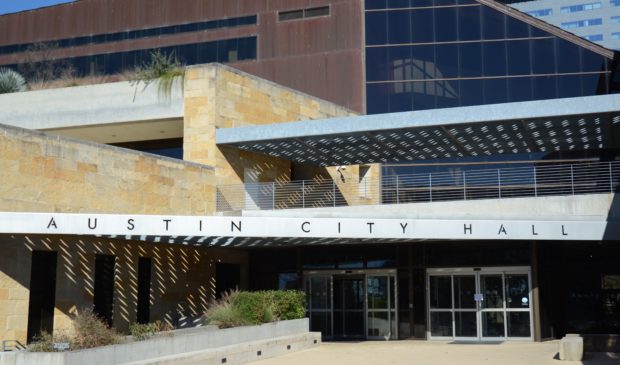Council continues to wait on new lobbying rules
Friday, October 20, 2017 by
Jack Craver On Thursday, Council Member Leslie Pool, who has been leading efforts to make changes to the city’s Anti-Lobbying Ordinance, told her colleagues that stakeholders are close to reaching an agreement over new rules.
“We’re achieving really good progress,” she said.
City Council voted in April to waive the Anti-Lobbying Ordinance for waste contracts, with the intent of exempting them from the rules until Council could craft changes to the ordinance, which the city’s largest waste hauler, Texas Disposal Systems, has criticized as unfair.
Texas Disposal Systems has objected to a “debarment” provision of the ordinance that allows the city to bar a company from bidding on city contracts for up to three years as punishment for violating the Anti-Lobbying Ordinance. Although “debarment” has never been invoked, the company has argued that vague language restricting contact between a company and city staff could jeopardize its existing contracts with the city.
Pool said on Thursday that she was planning on submitting a proposal to Council on Nov. 9, shortly after the Ethics Review Commission provides a recommendation on the matter. Her proposal likely will get rid of the debarment provision. It will also shorten the window of time during which those bidding on a solicitation are prohibited from talking about it with city staff or Council members.
The problem, however, is that the city is already in the process of soliciting bids for the removal and reuse of biosolid waste from the city’s water treatment plants. Those bidding on the contract are currently exempt from the ordinance as a result of Council’s vote in April. As of this morning, the deadline for bids on the contract was Nov. 7, two days before Council is set to vote on the revised regulations.
Council Member Alison Alter has said she wanted to ensure that that contract is subject to at least minimal lobbying restrictions, so on Thursday she offered a resolution directing staff to apply the current ALO to the biosolids solicitation.
Alter’s measure would put in place a “no contact” period between the time the bids are due and the time Council approves one of them. That is in contrast to the current ALO, which prohibits contact from the moment the city puts out a request for bids. In addition, Alter’s measure specified that companies bidding on the biosolids contract would not be subject to “debarment” if they are found in violation of lobbying rules.
Pool said she would not support the temporary measure, saying that she wanted to stick with focusing on the long-term changes to the ALO.
“I don’t want to do anything that will get in the way of that,” she said.
Council Member Ann Kitchen endorsed Pool’s reasoning, saying that she wanted to “honor the process” aimed at developing long-term changes to the ordinance.
Michael Whellan, a lobbyist representing Texas Disposal Systems, suggested that the city simply push back the due date for the biosolids contract by a few days. As long as Council voted to approve the new ALO before then, the new lobbying rules could be in place as Council begins to evaluate the different bids.
However, Alter replied that she was far from convinced that there would be a revised ALO ready to be adopted on Nov. 9, and that even if there is, it will take at least 30 days for staff to put in place new rules in accordance with the ordinance. There needed to be a separate measure specific to the biosolids contract, she argued.
Purchasing officer James Scarboro confirmed that putting in place a new ordinance in a matter of days was likely not feasible.
Council Member Jimmy Flannigan backed up Alter’s concerns, citing concerns about having a solicitation that is not subject to typical lobbying restrictions.
However, Council Member Pio Renteria described himself as “kind of insulted” by the idea that he would necessarily be influenced because lobbyists are allowed to call him about a contract.
“I’m mature enough to make a decision that’s right for the city,” he said.
Council Member Greg Casar agreed with Renteria’s self-assessment, saying that if all elected officials were like his colleague, ethics rules would not be necessary. Alas, he added, not all are as impervious to manipulation.
In the end, it looks like Alter’s measure will get another shot. She will introduce her proposal on Nov. 9, the same day that the full-scale Anti-Lobbying Ordinance is up for a vote. Council also voted unanimously to direct city staff to postpone the due date for the biosolids contract until Nov. 14.
Nikelle Meade, a lobbyist for Synagro, the company that currently takes care of the city’s biosolids and is once again bidding for the contract, told the Austin Monitor that it was “crazy” that TDS’ complaints had prompted Council to rewrite a major ordinance.
“We have one person who can’t live with the ordinance and we’re doing all of these cartwheels,” she said.
Her company, she said, was happy with the current ALO and saw no reason to change it. Attempts to erode restrictions on lobbying, she said, would only benefit the largest and best-connected firms and marginalize those without the resources to hire professional influence-peddlers.
Photo by John Flynn.
The Austin Monitor’s work is made possible by donations from the community. Though our reporting covers donors from time to time, we are careful to keep business and editorial efforts separate while maintaining transparency. A complete list of donors is available here, and our code of ethics is explained here.
You're a community leader
And we’re honored you look to us for serious, in-depth news. You know a strong community needs local and dedicated watchdog reporting. We’re here for you and that won’t change. Now will you take the powerful next step and support our nonprofit news organization?



